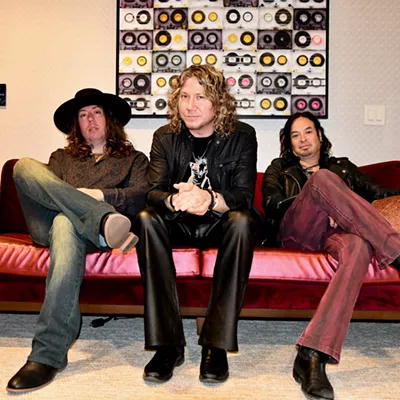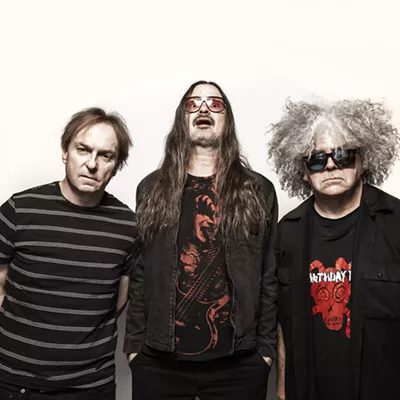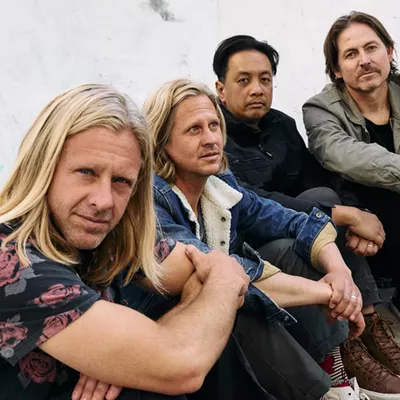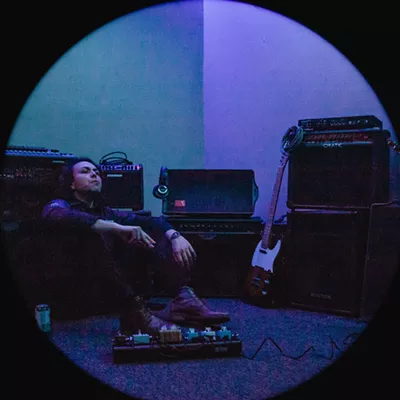Old-school country-folk beatnik-cowboy singer/songwriter Tom Russell holds a certain measure of respect for the Southwest indie-rock scene, especially younger artists who recently have emerged from Tucson's Wavelab Studio with killer tunes and classic albums—artists like Calexico, Neko Case, DeVotchKa and Los Lonely Boys.
Why else would Russell hole up in producer Craig Schumacher's sonic lair to record what critics are calling the El Paso legend's best album to date?
Throughout Blood and Candle Smoke, Schumacher applies his distinctive touch, largely eschewing the straight-on Tex-Mex format of Russell's previous efforts in favor of rich, world-music instrumentation—everything from Nigerian palm-wine guitar to the Oshogbo Orphan Choir.
Don't expect a reduction of testicular fortitude in Russell's lyrics and delivery, though: His music is never quiet; his worldview is cracked, intriguing, as are his characters, like the broken soul in "Darkness Visible," who notes: "This road is dark / when you only have one headlight."
"(Indie-rock) voices have become wimpy, and so has the songwriting," says Russell, 56, matter-of-factly, prompted by my first question: Where have all the real men singer/songwriters gone, and why doesn't indie rock offer any?
"It's that whole I-don't-mean-to-be-offensive thing," Russell goes on to explain. "The please-don't-hit-me school of songwriting. Like the Iron and Wine guy—he doesn't seem sure of himself and writes his lyrics in circles so you can't tell what he's saying exactly. Today, women want their men to be like that. I think creatively, everyone's been emasculated in this country. It's not about gender, but about hard-core songwriting. On the positive side, it's sonically compelling. The indie-rock scene is creating interesting stuff. On this new record, I tried to combine great songwriting with what these people are doing in Tucson."
Although he's recorded 25 celebrated albums, has made fans out of peers like Johnny Cash and Dave Alvin, and has been recognized as one of America's greatest living songwriters, it wasn't until 2006's Love and Fear that Russell reached a turning point: His songs became edgier, more personal. There was, for instance, the song "Stealing Electricity," which uses the image of a "Mexican dude" hanging dead from a telephone pole as a metaphor for the heart's voltage.
"That song still draws a lot of response from people who think it's not politically correct," he says. "Even my daughter said I needed to say 'Mexican man.' Political correctness has killed this country. I'm not a racist, but I know what works for me in a song."
If Russell sounds like he belongs to an older, more-crotchety generation, you might be right—except he's also capable of writing the loveliest of love songs, baring his heart to his wife in "Finding You." Or consider the mariachi-kissed elegy to Lady Blue ("Nina Simone"), in which Russell recounts hearing her voice on the jukebox for the first time while working in San Cristóbal, Mexico. He sings: "And I was so lost down there / Out of love and walking alone / But walking beside me was Nina Simone."
Indeed, such vulnerable moments provide tonic for what's otherwise a dark, apocalyptic-minded album. The lyrics in "Santa Ana Wind," for instance, are scarier than much of what they today call death-metal music, warning of an "ill-intentioned" current that begins as "a wisp of dust, then a whisper, then a curse." "American Rivers" works a similar vein, chronicling environmental destruction: "Their jigsawed old arteries, so clogged and defiled / No open-heart miracle will turn them back wild."
Does Russell think the end of nature—or the end of man—is near?
"With 'Santa Ana Wind,' I was reading a lot of Joan Didion at the time, and she writes (in her essay collection Slouching Towards Bethlehem) about an evil wind blowing across California, causing people to do bad things," reveals Russell. "With 'American Rivers,' I'm referencing cultural decay, only I'm putting it in environmental terms. I'm not a super-environmentalist, but I'll take a shot where I feel it's appropriate."
Speaking of literary endeavors, there's the high quality of Russell's lyrics and the way they sit on the page: perfectly, as if composed in the same manner as verse.
"That's subliminal and just comes from writing for so long," he admits. "(Bob) Dylan's lyrics look good, too. Mine are written to sing well. If they sing well, then they'll have an edited feel or appearance to them. I've been singing these songs (from Blood and Candle Smoke) over and over again in my hacienda, polishing them for four years. So, yeah, they're going to look good on paper. If a song is truly great, you can pick up any guitar and sing it, and it will move people."
Russell hopes to move many at his Club Congress show. He says he adores Tucson.
"I'm a Southwestern person and always loved agaves and cactus. Arizona is the top place for this kind of thing. You know, Tucson is far hipper than El Paso. Besides, I like to play to more of a rock 'n' roll audience."












